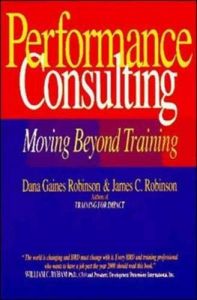Join getAbstract to access the summary!

Join getAbstract to access the summary!
Dana Gaines Robinson and James C. Robinson
Performance Consulting
Moving Beyond Training
Berrett-Koehler, 1995
What's inside?
Remember that the point of training isn’t training itself — it’s performing. Here’s how to focus not on what you learn, but on what you do.
Recommendation
To meet increasingly demanding organizational goals, human resource departments must shift from traditional training methods (i.e. what employees learn) to performance consulting (i.e. what employees must do to achieve those goals). Authors Dana Gaines Robinson and James C. Robinson, who consult in this field, present this intriguing assertion in a rather abstract and wordy book. Thus, this is a better volume for serious study than for casual perusal. The book gives you in-depth research and information on the complicated process of transforming your training operation to performance consulting. The book contains numerous graphs, guides and checklists, as well as a helpful resource section listing Human Resources associations and workshops. getAbstract recommends this book to those involved in human resources, particularly training specialists, training coordinators, instructional systems designers, consultants, and career and organizational developers, as well as managers and media specialists.
Summary
About the Authors
Dana Gaines Robinson and James C. Robinson have operated their own consulting company, Partners in Change, Inc., since 1981. They speak about performance technology at training conferences around the world.













Comment on this summary